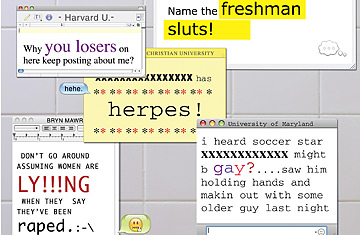
(2 of 2)
So colleges and universities have gone to war by other means. Students at North Carolina Central University urged their peers to boycott gossip sites. At Mount Holyoke College, where a localized gossip site generated a lot of hurt and anger, administrators held workshops to encourage students to talk things out face to face. Millsaps College went so far as to block access to JuicyCampus from its computers.
But schools must walk a fine line between protecting free speech and protecting students from one another. Liz Braun, Mount Holyoke's dean of students, says that from an administrative standpoint, it's a "very slippery slope." Even at Wesleyan, administrators have to tread lightly. The school told Frank he could not use its servers for his business, but, says director of media relations David Pesci, "We have other students who are entrepreneurs on campus who have businesses, and quite frankly, as long as they are conducting those businesses within the laws assigned to those areas, there's not much that we can get involved with."
So far at least, the law is on Frank's side. Although individuals can sue newspapers and other traditional-media outlets for making false or defamatory statements, the Communications Decency Act of 1996 shields website operators from liability for user-generated content, except for copyrighted materials like movies and music.
But that doesn't mean anonymous commenters are home free. This fall, two former Yale law students settled a lawsuit they brought against several people the women claimed had defamed them in anonymous comments on a law students' online discussion board. It took two years of tough litigation, but the women were able to identify some of the posters and obtain a settlement, the terms of which remain confidential.
"It's true that the actual authors would potentially be liable for posting libel," Frank says of ACB. "But libel is difficult to prove. I just really don't see it happening, but we'll cross that bridge when we come to it." And what about Frank? "I'm untouchable," he says.
